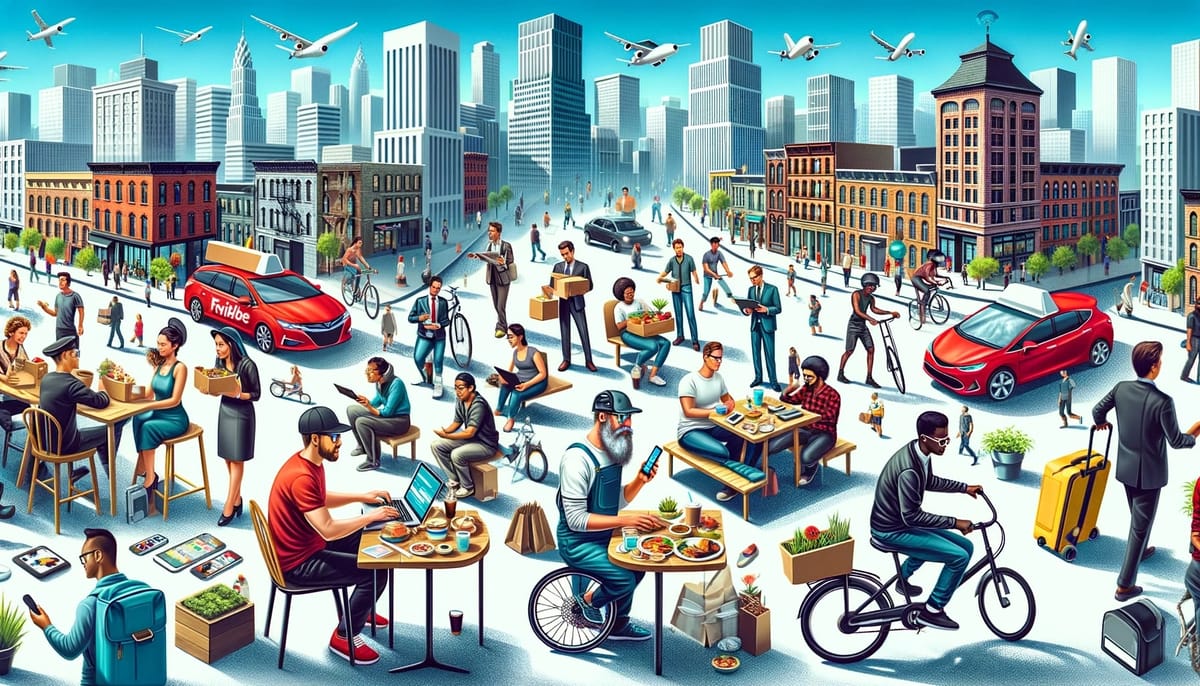The Labor Market in 2023: What to Expect
Explore 2023's labor market trends: remote work, gig economy growth, crucial soft skills, employee well-being, and the need for lifelong learning.

The job world in 2023 is changing fast. There are more jobs than people looking for work. This isn't just a short-term thing. It's because of big changes in the economy and new tech that's changing work itself.
The job market is where people find work and companies find workers. It's very important because it affects how people live and how well companies do. We are seeing big changes here.
One big change is robots and computers doing more work. Thanks to new tech in AI and machines, robots aren't just for simple tasks anymore. They're starting to do jobs we thought only humans could do. This is good because it can lead to more work done with less effort. But it's also worrying because some people might lose their jobs. We need to teach people new skills so they can work with new tech.

Along with robots, companies want workers with special skills. The job market is picky. Companies want people who can do today's jobs and learn tomorrow's jobs too. Workers need to keep learning all the time to keep up.
This makes the job market both exciting and tough. There are lots of jobs, which is good. But there's a gap between the skills people have and what companies need. We need to think about how we teach and train people for work.
Looking at 2023, we expect to see some trends in the job market:
- More people working from home: After COVID-19, lots of people kept working from home. This lets companies hire from a bigger pool of people. Workers also want a better balance between work and life.
- The gig economy is getting bigger: More people are doing short-term jobs or freelance work. This gives workers and companies more freedom. But it also makes people think about job safety and benefits.
- Soft skills are more important: With robots doing more tasks, skills like thinking well, being creative, and understanding feelings are key.
- Companies care more about workers' happiness: Companies want to keep good workers. So, they focus more on mental health and a good balance between work and life.
- Learning all the time: Workers and companies need to keep learning to stay on top. Learning new things is a must.
In 2023, the job market is full of chances but also needs careful thinking and planning. Doing well means being able to change, keep learning, and get ready for new things.
With robots doing more work, some jobs might disappear. Lots of people could lose their jobs. This is scary, but it's how tech changes work over time.
"Embracing the Home Office: The Rise of Remote Work Post-Pandemic"
Working from home has become a big thing after COVID-19. A lot of people who started to work from home during the pandemic are still doing it. This change has made a big difference in the job world.
For one, companies can now look for talent everywhere. They're not limited to hiring people who live close by. This means they have a bigger choice when it comes to finding the right person for the job. It's great for people who live in small towns or far away from big cities. They can now apply for jobs that used to be out of reach.
People working from home are also changing what they want from a job. They're looking for a good work-life balance. They want to spend less time commuting and more time with family or hobbies. This is a big deal for many people. It makes them happier and more relaxed.
But working from home is not just about comfort. It's about how we use technology. We use apps and tools to talk to our teams, manage tasks, and keep track of our work. These tech tools have become really important.
There are challenges, too. Some people might feel lonely or find it hard to stop working when their home is their office. Companies are trying to fix these issues. They are creating new ways to keep teams connected. They are also making sure people know when to work and when to take a break.
Working from home is also changing cities. With fewer people needing to go to an office, there's less traffic. This is good for the environment. It also means that city planners have to think differently about how cities work.
All in all, the rise of home-based work is a big trend. It is reshaping how we think about jobs and our day-to-day lives. As we look forward, it seems like this trend will keep growing. More and more people will likely work from home in the years to come.
"The Gig Economy: A World of Freelance and Flexibility"
More people are now choosing short-term jobs or freelance work. This is what we call the gig economy. It's a big deal today and is growing fast. People like it because they can choose when and where they work. It gives them freedom.
For companies, this is good too. They can hire someone for just the time they need them. It's flexible and often cheaper than having full-time staff. This helps small businesses a lot. They can compete with bigger companies by hiring expert freelancers.
But this new way of working isn't perfect. People who do gigs often miss out on things like health insurance or paid leave. These are benefits that full-time jobs usually offer. Without these, gig workers can feel uncertain about their future.
Gig work also means income that can go up and down. This makes it hard for people to plan their money. Sometimes, there's a lot of work. Other times, not so much. This can be stressful.
Yet, many choose the gig life for its perks. They like being their own boss. They enjoy the variety of projects. Some even earn more than they would in a regular job.
Technology is a big part of the gig economy. Apps and websites connect freelancers with gigs. They make it easy to find work. But they also mean that the gig worker has to stand out in a global market.
Looking ahead, the gig economy will probably keep growing. It could change what we think of as a 'normal' job. But there's a big question too. How will gig workers get the security that comes with traditional jobs? It's something for governments, companies, and workers to think about.
The gig economy is about freedom and flexibility. But it also brings challenges that we need to address to make sure everyone benefits.
"The Growing Value of Soft Skills in an Automated World"
Robots and computers are doing more tasks these days. They handle jobs that are hard or repetitive. This means people need to have different skills. We call these soft skills. They are really important now.
Soft skills are things like solving problems, coming up with new ideas, and working well with others. They also include being able to talk clearly and listen well. These skills help in all kinds of jobs.

Why are these skills so valuable? Because robots can't replace them. Robots might be smart, but they don't understand people like we do. They can't create like we can. This is where humans stand out.
Employers are looking for these soft skills. They want people who can think on their feet. They need workers who can get along with others. And they love when their team is creative.
As we use more technology, soft skills will be even more in demand. Schools and training programs are starting to focus on these skills. They are teaching students how to be good leaders and team players.
Soft skills make us better at our jobs. They help us work with technology, not against it. And they are key to a successful career in the future.
"Prioritizing Happiness: The Shift Towards Employee Well-being in the Workplace"
Companies today understand that happy workers are important. They know that when workers feel good, they do a better job. This is why many companies are now paying more attention to their workers' well-being.
A big part of this is mental health. Companies are offering support like counseling. They are also training managers to help. They want to make sure everyone feels okay to talk about stress and anxiety.
Work-life balance is also a priority. Companies are giving workers more control over their schedules. Some offer more vacation time. Others let people work from home sometimes. This helps workers spend time with family or enjoy hobbies.
There's a focus on making the workplace nicer too. Some offices have places to relax. Others offer fitness classes or healthy food. These things make the workday better.
These changes are good for workers. They feel more cared for. This makes them want to stay with the company. It's good for the company too. Happy workers work harder and come up with better ideas.
In the end, caring for workers' happiness is smart. It's good for the workers and the company. More and more, we'll see companies making happiness a big goal.
"Lifelong Learning: The Key to Staying Ahead in Today’s Workplace"
In today's fast-paced world, learning all the time is a must. Both workers and companies need to keep up with new information. This is how they stay ahead in the market.
Workers need to learn new skills to keep their jobs or get better ones. They have to be ready to change as their job changes. Learning doesn't stop after school. It's something we do our whole lives.
Companies need to help with this. They can give training or pay for classes. Some companies have online courses that their workers can take anytime. This helps the company because their workers get better at their jobs.
Technology is always changing. So are customers' needs. Companies that learn and adapt will do well. The same goes for workers. The ones who are always learning are the ones who go far.
Learning new things can be fun, too. It can be exciting to get better at something or to start something new. Workers who learn new things feel good about their jobs. Companies that support learning have happier workers.
Learning is the key to success now. It's not just about knowing things. It's about growing all the time. This is how we get ready for whatever comes next.
In conclusion, the job market in 2023 is shaped by remote work, the gig economy, the importance of soft skills, worker well-being, and continuous learning. These trends reflect a deeper evolution in how we view and perform work. Embracing flexibility, creativity, and ongoing education are pivotal. Companies that support these values are likely to thrive, attracting and retaining the best talent. For workers, adaptability and a commitment to self-improvement are crucial for success. Together, these elements form the blueprint for a modern, dynamic workforce ready to meet the future's challenges and opportunities.




